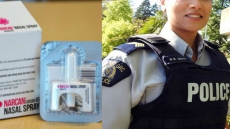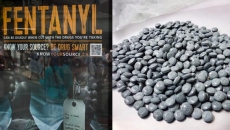ST. LOUIS — A St. Louis jury on Thursday awarded a California woman more than $70 million in her lawsuit alleging that years of using Johnson & Johnson's baby powder caused her cancer, the latest case raising concerns about the health ramifications of extended talcum powder use.
The jury ruling ended the trial that began Sept. 26 in the case brought by Deborah Giannecchini of Modesto, California. She was diagnosed with ovarian cancer in 2012. The suit accused Johnson & Johnson of "negligent conduct" in making and marketing its baby powder.
"We are pleased the jury did the right thing. They once again reaffirmed the need for Johnson & Johnson to warn the public of the ovarian cancer risk associated with its product," Jim Onder, an attorney for the plaintiff, told The Associated Press.
"We deeply sympathize with the women and families impacted by ovarian cancer," Carol Goodrich, a spokeswoman with Johnson & Johnson, said in a statement. "We will appeal today's verdict because we are guided by the science, which supports the safety of Johnson's Baby Powder."
Earlier this year, two other lawsuits in St. Louis ended in jury verdicts worth a combined $127 million. But two others in New Jersey were thrown out by a judge who said there wasn't reliable evidence that talc leads to ovarian cancer, an often fatal but relatively rare form of cancer. Ovarian cancer accounts for about 22,000 of the 1.7 million new cases of cancer expected to be diagnosed in the U.S. this year.

About 2,000 women have filed similar suits, and lawyers are reviewing thousands of other potential cases, most generated by ads touting the two big verdicts out of St. Louis — a $72 million award in February to relatives of an Alabama woman who died of ovarian cancer, and a $55 million award in May to a South Dakota survivor of the disease.
Much research has found no link or a weak one between ovarian cancer and using baby powder for feminine hygiene, and most major health groups have declared talc harmless. Johnson & Johnson, whose baby powder dominates the market, maintains it's perfectly safe.
But Onder of the Onder Law Firm in suburban St. Louis, which represented plaintiffs in all three St. Louis cases, cited other research that began connecting talcum powder to ovarian cancer in the 1970s. He said case studies have indicated that women who regularly use talc on their genital area face up to a 40 per cent higher risk of developing ovarian cancer.
Onder has accused Johnson & Johnson of marketing toward overweight women, blacks and Hispanics — the very same women most at-risk for ovarian cancer, he said.
Factors known to increase a women's risk of ovarian cancer include age, obesity, use of estrogen therapy after menopause, not having any children, certain genetic mutations and personal or family history of breast or ovarian cancer.
The International Agency for Research on Cancer classifies genital use of talc as "possibly carcinogenic." The National Toxicology Program, made up of parts of several different government agencies, has not fully reviewed talc.
Talc is a mineral that is mined from deposits around the world, including the U.S. The softest of minerals, it's crushed into a white powder. It's been widely used in cosmetics and other personal care products to absorb moisture since at least 1894, when Johnson & Johnson's Baby Powder was launched. But it's mainly used in a variety of other products, including paint and plastics.

The two St. Louis verdicts were the first talcum powder cases in which money was awarded. A federal jury in 2013 sided with another South Dakota woman, but it ordered no damages, a spokeswoman for Onder's firm said.
Johnson & Johnson has been targeted before by health and consumer groups over ingredients in its products, including Johnson's No More Tears baby shampoo. The company agreed in 2012 to eliminate 1,4-dioxane and formaldehyde, both considered probable carcinogens, from all products by 2015.



